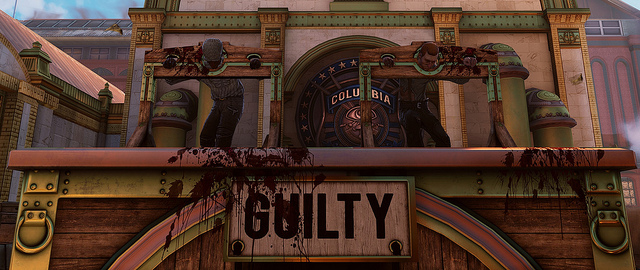
Credit goes to Steven Strom (who also has his own column here on SideQuesting every week) for coming up with the title for my new column. I don’t have a mission statement for A Fair Colp, it’s simply a way for me to publish what I’ve been thinking about every week, whether it’s like today’s critique of BioShock Infinite’s violence, a rant, or something else. The goal isn’t to be definitive, but to add to the general discourse about games.
[dropcap]B[/dropcap]ioShock Infinite is one of those games that makes you feel like you should write something about it. I feel that way about a lot of games. I’m always sifting through my experience, looking for ideas to pluck out and form into a topic. Usually, I wait too long and my opinion becomes expressed across several different reviews and critiques. I often take the easy way out and point to them instead of writing my own. But games like BioShock Infinite feel like they could be discussed for a long time, just as the first BioShock has been. BioShock Infinite is a game I’m still thinking about, still distracting me while I’m playing other games. This is rare. The last game to have this effect on me was Spec Ops: The Line.
Leigh Alexander wrote the first piece that nails what I think many people are criticizing BioShock Infinite for. She says it all with this: “It has something to say, certainly. It just says more about its own self than about the ideas it wanted to explore.” She’s talking about the game’s use of violence as a core mechanic, and how despite all the strong themes it seems to want to discuss, all of them are muted under the sound of gunfire and growling.
She’s right. BioShock Infinite has so much nuance in its narrative that when you find yourself shooting rockets at ghosts and twisting heads off in the middle of combat, you wonder what the game could have been without all the action. My typical routine was to kill all the enemies in a level as fast as possible, as mindlessly as possible, and then to walk around the environment, piecing together its story. My favorite parts of the game were not the shooting bits, but moments where Columbia stood still and I got to run around and gawk at all the detail.
At the same time, I don’t support the argument that BioShock Infinite should have been a four- to six-hour-long narrative trip like Dear Esther. Yes, the first 45 minutes or so are wonderful. It’s a brave introduction for a triple-A action game, but I can’t see where the game’s drama would come from in what would essentially be a theme park. Now, set this fictional game after Columbia has fallen and I might be interested. In doing that, though, you would be creating something very similar to the first BioShock, which is where the no combat argument makes a lot more sense to me.
I don’t think that’s the story Irrational Games wanted to tell. I believe in some ways, or at least for a short time, the violence in BioShock Infinite communicates how brainwashed Columbia really is. The people of Columbia fight for their beliefs. They’re afraid of Booker, afraid of someone questioning everything their city is built on. In Rapture, you felt isolated by the thick glass and the miles of sea above you, here, it’s the people. The raffle scene with the couple is the first hint that Columbia isn’t all beauty and ambition. It was just as unsettling for me as the opening moments of the first BioShock, only it said everything I needed to know in the span of a few seconds, in broad daylight, surrounded by non-violent characters.
And when the first blood is shed, it’s shocking, then Columbia’s true colors start to show. Before the action begins to feel unnecessary, you’re explicitly shown what ignorance and fear can bring someone to do. It makes you think. It makes you realize how wrong everything is in Columbia.
I’m glad BioShock Infinite isn’t the indie game some wish it could be. When I briefly worked in retail last year, I tried my best to get people to play Spec Ops: The Line. I told the people looking for something like Call of Duty to give it a try, and when I told them the game actually had something to say about killing other people, it’s like I woke them up. A few of them were intrigued enough to take it home that day.
I think the use of violence in games needs to be questioned, both by players and the games themselves. I also think it’s something we have to ease into. People like me, who play a lot of games, often get stuck in the idea that every game needs to be wildly inventive and to say something profound about the medium, and it’s true, those are typically the games I like the most, but we need bigger games that are smart too. BioShock Infinite doesn’t have good excuses for most of its violence. But I’d rather have more games like BioShock Infinite, showing players that games can say something, to make them think about the violence, rather than another voiceless Call of Duty.

4 Comments